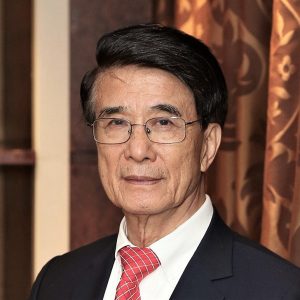
- Physics 51' NCKU
- Professor of Physics, T. L. L. Temple Chair of Science
- Founding Director & Chief Scientist, Texas Center for Superconductivity at the University of Houston
Professor Ching-Wu Chu is currently the Temple Professor of Science, Professor of Physics, Founding Director and Chief Scientist of the Texas Center for Superconductivity at the University of Houston, and President Emeritus of the National Taiwan University System and retired President Emeritus and Professor of the Hong Kong University of Science and Technology. Born in Hunan, China, he received his B.S. from National Cheng Kung University in Taiwan, his M.S. from Howard University in New York, and his Ph.D. from the University of California, San Diego, all in physics. After completing his research at Bell Labs, Professor Jingwu Zhu worked at Cleveland State University, and in 1979, he was appointed to the University of Houston. He founded several research centers there, including NASA's Space Epitaxy Center and the Texas Center for Superconductivity. He was the founding director of the Texas Center for Superconductivity at the University of Houston from 1987 to 2001 and the president of the Hong Kong University of Science and Technology from 2001 to 2009. He has also served as a consultant and guest researcher at various institutions, including Bell Labs, Los Alamos National Laboratory, Marshall Space Flight Center, Algonquin National Laboratory, and DuPont.
Professor Chu has a long and distinguished career in the physics of superconducting, magnetic and dielectric related materials. In January 1987, his research group successfully discovered a new superconducting material at 93 K (-180 °C) (the first time it exceeded the temperature of liquid nitrogen), ushering in a new era of high-temperature superconductivity research and applications. He continued to discover new materials and set new records for superconducting transition temperatures in subsequent experiments, and in 1993 he raised the temperature of superconducting transition to 164 K (-109 °C). He is still active in the field of basic and applied research on high temperature superconductivity and has published more than 660 papers in many prestigious journals. He was awarded honorary doctorates from Northwestern University, Fordham University, Chinese University of Hong Kong, Florida International University, Farmingdale College of the State University of New York, Hong Kong Baptist University, Jinyi University of Taiwan, University of Macau, Loughborough University, and Wheatley College. In 2000, he was named one of the 100 most influential people in gas and electricity in this century by Century Dynamics, a publication of the Energy Market.
Professor Chu has received numerous awards, including the National Medal of Science, the highest honor in American science, the International New Materials Award, the Comstock Award of the American Academy of Sciences, the Texas Instruments Founder's Award, the Leroy Randle Grumman Award, the World Culture Council Award for Contributions to Science, the New York Academy of Sciences Award in Physical and Mathematical Sciences, the Bernd Matthias Award, the St. John's College of Science Award, and the St. John's College of Science Award. Matthias Award, St. Martin de Porres Award, Esther Farfel Award, John Fritz Award, Ettore Majorana - Erice Award, and IEEE Applied Supercomputing Award. - He is also the recipient of the IEEE Max Swerdlow Award for Applied Superconductivity. Prof. Zhu serves on the editorial board of several professional journals and is a member of the board of directors of the Alliance for Commercial Applications of Superconductors. He has served on numerous committees in the United States, China, and Taiwan, including the Presidential Commission on the National Medal of Science (2007-2009); the National Research Council's Committee on Research Universities (2010-2011); the Commission on the Globalization of Science and Technology - Opportunities and Challenges for the Department of Defense (2013-2014); the National Academy of Sciences, the National Academy of Engineering, and the National Academy of Medicine's Expert Panel on Smart Technologies. The Expert Panel on Smart Technologies (2015-2019).
